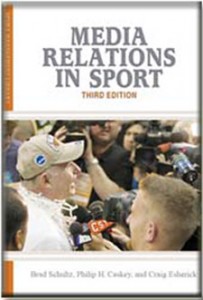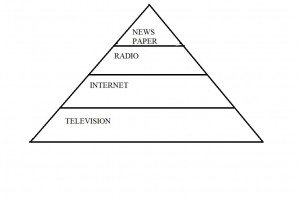Posts Tagged “Twitter”
 Glenn Stout is the series editor for The Best American Sports Writing series. Glenn Stout is the series editor for The Best American Sports Writing series.
In 2004 Glenn Stout made Richard Ben Cramer editor for that year.
What Glenn Stout had to say about the sports writers.
- “Sports writers have never had a higher profile”
- The big money that is coming into sports these days helped spawn things like cable channels, Internet sites, and all sports radio, there has been a lot of spill-over for those who write about sports for a living
- There may not be more jobs or more markets but there is unquestionably more opportunity to become famous and make money.
Glenn Stout on the new age of sports journalism.
- “Many of today’s best-known sports writers are not celebrated for the quality of the work on the page, but for the volume of their words spoken on the airwaves.
In today’s day and age there are so many ways to get your thoughts on the airwaves.
How Glenn Stout feels about the new form of sports journalism.
- “They may have become famous and they may have become rich, but very few have become better writers.”
Glenn Stout on being the series editor of the Best American Sports Writing series.
- Every season he reads every issue of hundreds of sports and general interest magazines in search of writing that might merit inclusion in The Best American Sports Writing.
- He also contacts the sports editors of some three hundred newspapers and request their submissions.
- He also encourages writers, readers, and all other interested parties to send him stories they have written or read in the past year that they would like to see reprinted in the series.
Glenn Stout on his choice for editor of the 2004 edition.
- “Richard Ben Cramer approached his duties this year with enthusiasm, and the result is a volume of which we are both justifiably proud.”
 No Comments »
No Comments »
 Jeff Zillgitt met with my sports journalism class on Tuesday, March 29. Jeff Zillgitt met with my sports journalism class on Tuesday, March 29.
Jeff Zillgitt is an NBA beat reporter for USA Today.
Jeff Zillgitt on Frank DeFord
- When he was around 20 years old he would spend hours reading Frank DeFord’s stories. Most other people his age were out partying and socializing but Jeff could not tare himself away from the pages.
- He wanted to write just like Frank DeFord.
- “Your not going to be as good as your favorite writer” Jeff Stated. “Just because your not gonna be frank doesn’t mean you wont find your place, it is up to you to find your place.”
- He fond out what he could do well and It is possible frank couldn’t write about the NBA. In Jeff’s job he has to turn out copy all the time. Frank would sometimes spend a couple months on his stories. Also Frank didn’t have to worry about twitter or some on-line blog.
A New Age in Journalism
- College students today are in the heart of the new age of journalism
- “I’m fairly chained to my phone, the digital age has made things very accessible. I tweet from my phone and my e-mail is on my phone, it gets to be a little much.” Says Jeff.
- You don’t want to miss a story, your gonna get beat you might not break every story but you don’t want to miss a story.
- It never hurts to use the phone and call some people, it is a good way to gain some credibility.
 No Comments »
No Comments »
 Chapter 8 Chapter 8
Event Management
Event management can be categorized into three primary events: game management/ game-day operations, press conferences/ media days, and special events.
A sports information director must excel at preparation, organization, and communication, all while being a hospitable host.
There are three types of operations in order to host a sporting event: pre-game, in-game/ game-time and post-game.
Pre-Game Preparation
A sports information director must ensure that the press box/ press table is functional weeks before the season-opener.
The SID is responsible for many tasks including: stocking of media guides for both his/her school and the opponent, seeing that enough accessories are ready (paper, pencils, working copy machine) and ensuring the internet is available for the media that will be using it either via wireless or Ethernet connections.
The SID will also plan for the food that will be served in the press box/ press row during the season. An SID’s budget will dictate many of the decisions regarding food but meals for each home game are determined well in advance.
Obviously, giving everyone a nice sit down dinner would be ideal, but some teams simply do not have the budget. High profile, division 1 schools often provide sit-down dinners. Smaller schools can only provide niceties. They often provide coffee, soda, and donuts in working media areas.
An in-season game work week begins on Sunday. This is right after a traditional game which is played on Saturday. The SID is responsible for updating the team statistics from the previous day and nominating his/her players for conference, regional, and national players of the week awards. SID’s also assist the coaches with any media responsibilities and prepare the weekly game notes for the upcoming game.
Another very important task that the SID is responsible for is issuing credentials. He/she will issue credentials to any local, regional, or national media that request to attend and to report on the upcoming game.
Also, during the week of a game, a schedule of interview availability for the organization’s coaches and players should be distributed so that any media planning to follow the SID’s organization that week are aware of interview opportunities.
If the game is on television, the SID is responsible for seeing that the television talent meeting with some of the team’s notable players and coaches. This is to possibly follow up on some story lines. This is a great opportunity to further promote your team.
On game-day the SID must arrive no later than two to three hours before the start time to assist with any media issues.
In-Game Operations
Once the sporting event has begun the well-prepared SID has the school’s, conference’s, and NCAA’s record books readily available should any statistical feats from the contest set new standards. And, if that happens then the internal and external public address announcers, television, and the home radio broadcasters should immediately be informed so the general public and the media are aware of the record-breaking information.
Also, today we have many technological advances that allow us to get information out the the general public faster than ever. We can use twitter and many other forms of social media while the game is happening.
Post-Game Duties
The primary duties of an SID in the post-game involve managing the head coach’s press conference, win or lose, and bringing the requested players into the press conference once the coach has finished.
Even if the team loses the media still has a job to do.
The quotes from the entire press conference should be recorded, transcribed, and distributed with the contest’s entire statistical package to the media as quickly as possible after the game. A press-release story needs to be written for the organization’s website and for immediate distribution to members of the media that were unable to attend the contest.
 No Comments »
No Comments »
 Television: ESPN, Fox, Comedy Central, and Cartoon Network Television: ESPN, Fox, Comedy Central, and Cartoon Network
Internet: Facebook, Twitter, Yahoo Sports, ESPN
Radio: 106.7 the Fan, DC 101
Newspaper: The Washington Post
 No Comments »
No Comments »
|
 Glenn Stout is the series editor for The Best American Sports Writing series.
Glenn Stout is the series editor for The Best American Sports Writing series.



 Entries (RSS)
Entries (RSS)